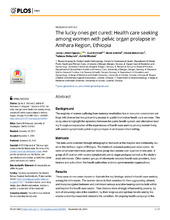| dc.contributor.author | Gjerde, Janne Lillelid | en_US |
| dc.contributor.author | Rørtveit, Guri | en_US |
| dc.contributor.author | Adefris, Mulat | en_US |
| dc.contributor.author | Mekonnen, Hibste | en_US |
| dc.contributor.author | Belayneh, Tadesse | en_US |
| dc.contributor.author | Blystad, Astrid | en_US |
| dc.date.accessioned | 2019-05-22T12:26:31Z | |
| dc.date.available | 2019-05-22T12:26:31Z | |
| dc.date.issued | 2018-11-26 | |
| dc.Published | Gjerde JL, Rørtveit G, Adefris M, Mekonnen, Belayneh T, Blystad A. The lucky ones get cured: Health care seeking among women with pelvic organ prolapse in Amhara Region, Ethiopia. PLoS ONE. 2018;13(11): e0207651 | eng |
| dc.identifier.issn | 1932-6203 | |
| dc.identifier.uri | https://hdl.handle.net/1956/19694 | |
| dc.description.abstract | Background: The majority of women suffering from maternal morbidities live in resource-constrained settings with diverse barriers preventing access to quality biomedical health care services. This study aims to highlight the dynamics between the public health system and alternative healing through an exploration of the experiences of health care seeking among women living with severe symptomatic pelvic organ prolapse in an impoverished setting. Methods: The data were collected through ethnographic fieldwork at the hospital and community levels in the Amhara region of Ethiopia. The fieldwork included participant observation, 42 semi-structured interviews and two focus group discussions over a period of one year. A group of 24 women with severe symptomatic pelvic organ prolapse served as the study’s main informants. Other central groups of informants included health care providers, local healers and actors from the health authorities and non-governmental organisations. Results: Three case stories were chosen to illustrate the key findings related to health care seeking among the informants. The women strove to find remedies for their aggravating ailment, and many navigated between and combined various available healing options both within and beyond the health care sector. Their choices were strongly influenced by poverty, by lack of knowledge about the condition, by their religious and spiritual beliefs and by the shame and embarrassment related to the condition. An ongoing health campaign in the study area providing free surgical treatment for pelvic organ prolapse enabled a study of the experiences related to the introduction of free health services targeting maternal morbidity. Conclusions: This study highlights how structural barriers prevent women living in a resource-constrained setting from receiving health care for a highly prevalent and readily treatable maternal morbidity such as pelvic organ prolapse. Our results illustrate that the provision of free quality services may dramatically alter both health-and illness-related perceptions and conduct in an extremely vulnerable population. | en_US |
| dc.language.iso | eng | eng |
| dc.publisher | PLOS | eng |
| dc.rights | Attribution CC BY | eng |
| dc.rights.uri | http://creativecommons.org/licenses/by/4.0 | eng |
| dc.title | The lucky ones get cured: Health care seeking among women with pelvic organ prolapse in Amhara Region, Ethiopia | en_US |
| dc.type | Peer reviewed | |
| dc.type | Journal article | |
| dc.date.updated | 2019-02-18T21:54:03Z | |
| dc.description.version | publishedVersion | en_US |
| dc.rights.holder | Copyright 2018 The Author(s) | |
| dc.identifier.doi | https://doi.org/10.1371/journal.pone.0207651 | |
| dc.identifier.cristin | 1671214 | |
| dc.source.journal | PLoS ONE | |

